One of the many benefits the U.S. Department of Veterans Affairs provides is its VA Chaplain Service, in recognition that spiritual health is an important part of overall health and wellness. This facet of comprehensive VA care exists to make sure that U.S. veterans have access to the highest level of pastoral care at all times, especially when they are receiving medical treatment through VA facilities. In this role, a VA chaplain can serve veterans, active-duty military personnel, and their families in a wide variety of ways.
8 Services Provided by a VA Chaplain
- Grief support
- Decision-making
- Advance directives
- Spiritual care
- Educating the health care team
- Communication with caregivers
- Conflict resolution
- Leadership of important rituals
The important mission of the VA’s Chaplain Service is to ensure that U.S. veterans have access to spiritual and religious care as part of their patient care services. This commitment extends to veterans’ family members as well. VA chaplains are on call around the clock, 365 days per year, to offer their wisdom and spiritual support to veterans and their families.
VA chaplains assist veterans, particularly those seeking treatment through VA medical facilities, with religious, spiritual, moral, and ethical issues they may face. Whether just listening or providing insight into decision-making around advance directives and other end-of-life decisions, VA chaplains serve as an invaluable resource to U.S. veterans, military personnel, and their families.
Spiritual care offers concrete health benefits – research shows that VA patients who have chaplains involved in their health care leave the hospital sooner and better manage their pain and stress.
What Is a VA Chaplain?
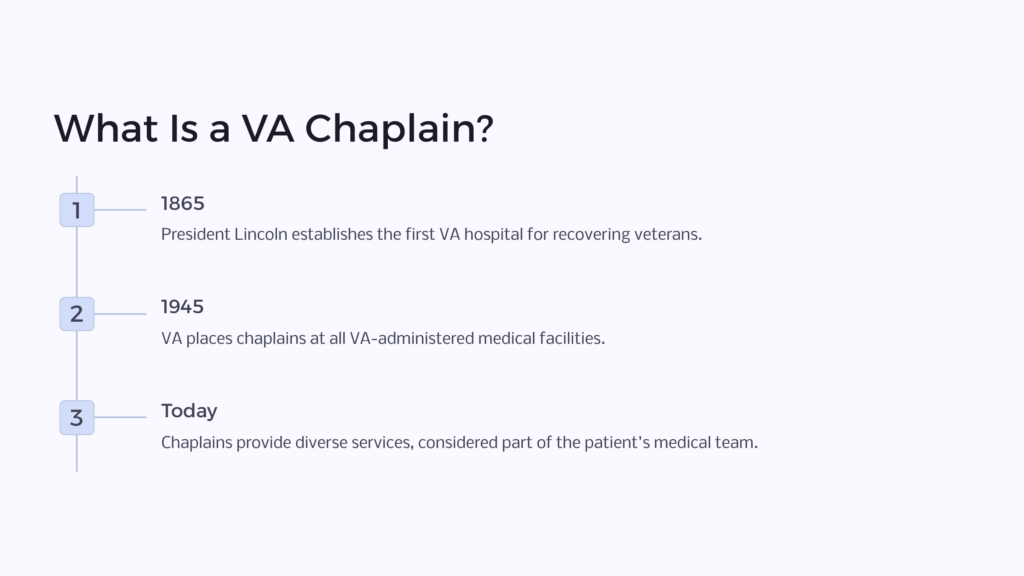
The Chaplain Service of the U.S. Department of Veterans Affairs dates back to 1865. President Abraham Lincoln signed legislation that established the first VA hospital for recovering veterans – adding to what would later become known as VA disability benefits. By 1945, the VA had placed chaplains at all VA-administered medical facilities, recognizing the tremendous value chaplain service brings to recovering and disabled military members.
Today, these chaplains provide many different services to patients who are seeking medical care through VA facilities, and they are considered part of the patient’s medical team – even completing rounds with practicing physicians and recording spiritual care interventions in patients’ medical charts. In addition, every VA medical facility has a chapel prepared to accommodate the full range of religious traditions and is open for prayer, meditation, or simple, quiet meditation.
Today’s VA chaplains are trained to help with the religious, spiritual, psychological, and social needs of veterans, their families, and medical staff as part of the full package of veterans benefits. You can find VA chaplains in VA-administered hospitals, clinics, and nursing homes.
While a VA chaplain may be formally associated with a particular faith, VA chaplains are trained, willing, and able to work with veterans and active-duty military personnel of all faith backgrounds. VA chaplains help ensure that every veteran patient has the opportunity to freely exercise their religion in a way that meets their specific needs.
VA chaplains also protect veterans from having any specific religious viewpoint imposed on them while they receive medical care in a VA-administered facility. VA chaplains provide religious, spiritual, and pastoral care only at the request of, and with the consent of, individual veteran patients.
8 Services Provided by a VA Chaplain
VA chaplains provide several essential services, many of which we’ve outlined below.
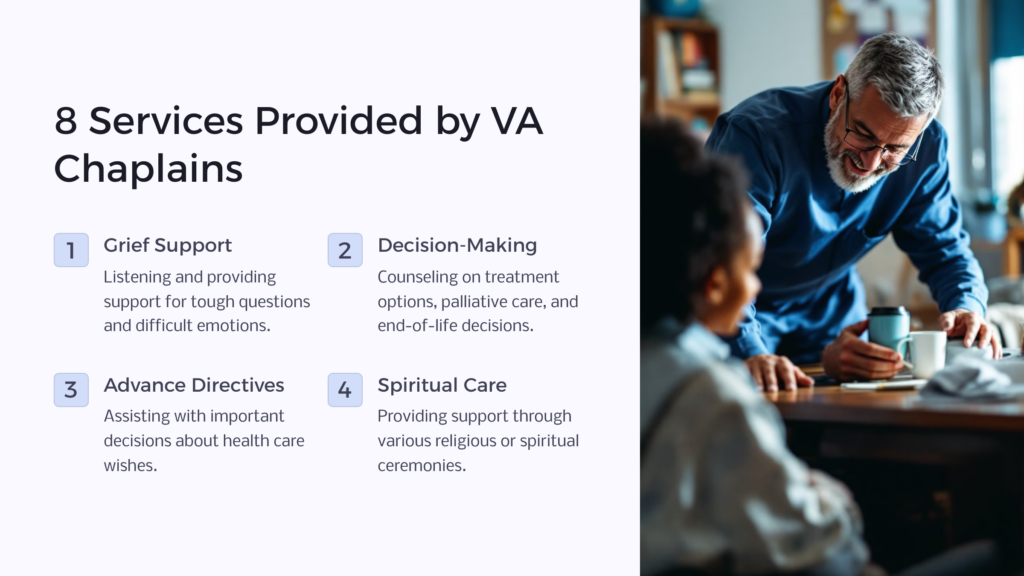
1. Grief Support
One of the key roles a VA chaplain plays is that of listener. Health care decisions often bring grief, both for the patient and for family members. VA chaplains are trained and willing to listen and provide support for the tough questions and difficult emotions medical treatment can raise.
Working with a VA chaplain can provide a sense of social support and help patients and families develop essential skills for coping with their grief. They also can help VA patients determine what gives their lives meaning and communicate those beliefs to the rest of the patient’s VA health care team.
2. Decision-Making
Medical care brings with it a broad spectrum of decisions, including treatment options, palliative care, advance directives, and various end-of-life decisions. VA chaplains are there every step of the way to counsel veterans and their families as they deal with grave decisions ranging from treatment options to end-of-life directives. In particular, many veterans and families may struggle with the ethical and moral quandaries associated with organ donation. Discussing options with a VA chaplain may help ease the decision-making process.
3. Advance Directives
Advance directives are legal forms that provide directions regarding wishes for your health care. An advance directive is used if a VA patient becomes unable to make their own health care decisions because of a medical condition.
VA chaplains are trained and able to assist veterans with making important decisions about their advance directives, along with contacting legal assistance to prepare formal documentation. Chaplains also may be able to counsel direct veteran patients facing end-of-life decisions on how best to designate their VA survivor benefits.
4. Spiritual Care
VA chaplains can provide spiritual care and support in many different ways, from simple listening to facilitating religious or spiritual ceremonies on behalf of veterans and their families. These chaplains help veterans and their family members through hospital stays, outpatient treatment, and even extended care services and community care. When appropriate, they also liaise with personal clergy or spiritual care providers in the community on behalf of VA patients.
If you are seeking patient care services from a VA medical center, you will be asked whether you abide by any particular faith tradition that the center should know about. If you answer, “yes,” a chaplain likely will come to see you. But even if you answer, “no,” you can meet with a chaplain at any point during your medical VA care to discuss any matters that are important to you. They are available for prayer, counseling, observations of holy days, or reading and discussing sacred texts – or any other need the VA patient may have.
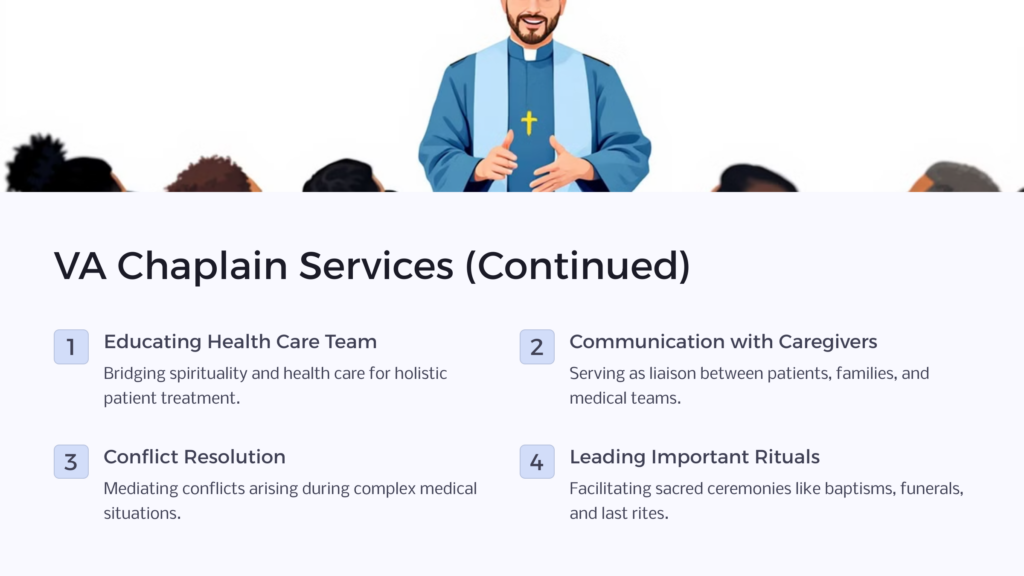
5. Educating the Health Care Team
VA chaplains play a key role when it comes to educating the veteran’s medical team about the impact of multi-faith and multi-cultural traditions on clinical services. These chaplains serve as an important bridge between spirituality and health care, and ensure that others on the medical team are aware of how pastoral care fits into the holistic health care approach provided by the medical team. In some cases, a VA chaplain may offer specific educational services to other members of the medical team.
6. Communication with Caregivers
VA chaplains can be a tremendous resource by serving as a liaison between a patient’s caregivers and the patient, the patient’s family, or the patient’s medical team. Serving as an advocate for the patient’s wishes, the VA chaplain can offer everyone involved counsel or guidance on a wide variety of questions and issues associated with the veteran’s medical care.
7. Conflict Resolution
VA chaplains often can serve as mediators. Many times, the stress and decision-making associated with medical care can result in conflict among family members, or even between family members and members of the patient’s medical team. A VA chaplain can help work with all parties to find a productive solution to the many conflicts that may arise during intense and complex medical situations. VA chaplains may lead group therapy sessions to help families productively move through conflict.
8. Leadership of Important Rituals
VA chaplains are equipped to lead the spiritual and religious rituals that are most sacred to U.S. veterans undergoing medical care. For example, VA chaplains can facilitate baptisms, communion, funerals, worship services, weddings, and last rites on behalf of veterans and their families.
How To Become a VA Chaplain
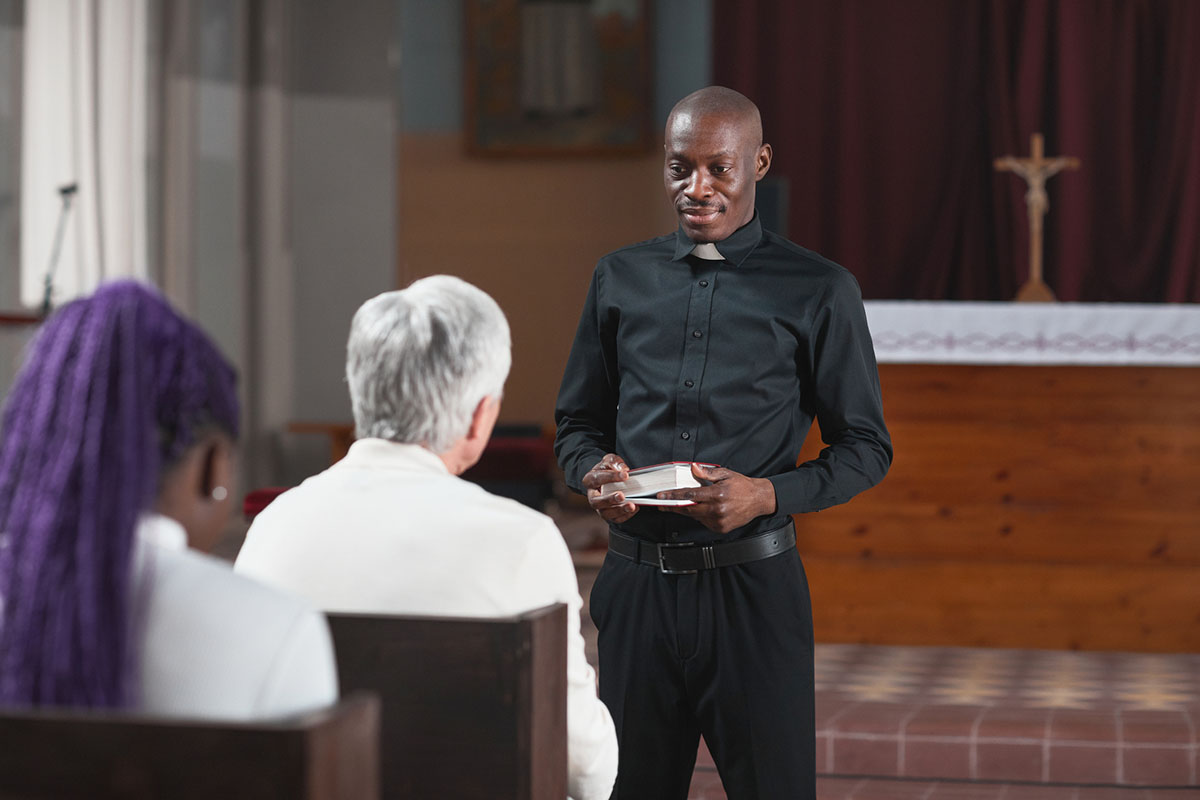
VA chaplains are employed at VA medical facilities in three different capacities: full-time, part-time, and intermittent. To be considered for the role of full-time or part-time VA chaplain, an applicant must typically have the following qualifications:
- U.S. citizen
- Hold a Master of Divinity degree or degree of equal qualification and religious education
- Show an ecclesiastical endorsement dated within 12 months of applying for the VA chaplain position
- Completed at least two courses of Clinical Pastoral Education in a program accredited by the Association for Clinical Pastoral Education or the National Association of Catholic Chaplains
- Fluent in written and spoken English
- Registered with Selective Service or have a valid exemption
- Meet any appropriate requirements for specialized chaplaincy service – such as mental health or substance abuse counseling
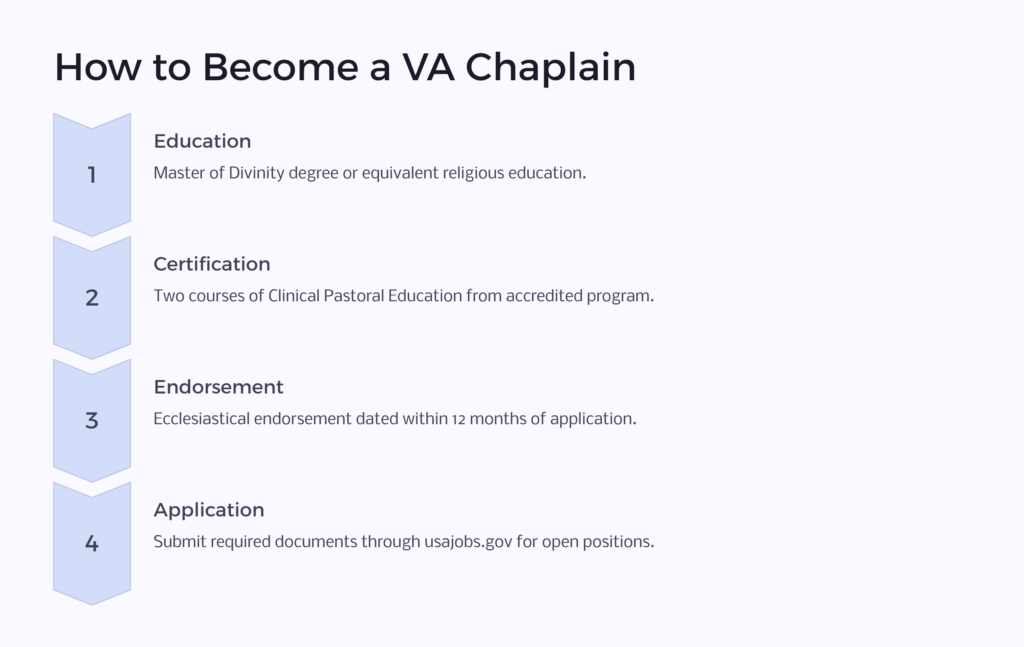
Available full-time and part-time VA chaplain positions are listed at usajobs.gov. Simply search “chaplain” to see all available job openings. To apply for a specific position, you must submit a resume, your ecclesiastical endorsement, applicable school transcripts, a copy of your DD-214 form if you’re a veteran, and copies of your clinical pastoral education certification.
Depending on the specific position you’re applying for, you may also be asked to submit additional documentation related to that role. Letters of recommendation are not required with your application, but it may strengthen your application to include recommendations from recent employers where applicable.
VA chaplain applications are reviewed by the Board of Excepted Service Examiners, which is composed of current VA chaplains at the National VA Chaplain Center in Hampton, Virginia. All applicants are scored according to a rubric, with veteran applicants receiving extra points. The board then refers the highest scoring candidates for each position to the medical center at which the open position is based.
Once your application has been reviewed, you will receive an official notification of results (usually via email) to let you know your rating and whether your application was referred to the VA facility with the open position. You will also be notified when a position for which you’ve applied has been filled.
For intermittent contract chaplain services, VA medical centers will recruit locally to supplement their full- and part-time chaplain staff. To find out about opportunities, you can call the chaplain office for the VA location you’re interested in and ask whether they currently are accepting applications for contract chaplain work. Please note that both contract and fee-based chaplains are required to meet the same qualification requirements as full-time and part-time chaplains employed by the U.S. Department of Veterans Affairs.
VA Chaplain Benefits and Services
The role of the VA chaplain has long been recognized as an essential part of complete and holistic health care for U.S. veterans, active-duty military personnel, and their families seeking medical treatment through VA facilities.
Any veteran or family member, regardless of religious affiliation, is welcome to speak with a chaplain at any point in the medical treatment process. Many VA patients and their families find that working with a VA chaplain helps them develop appropriate strategies for coping with the stress, grief, and anxiety that often accompany making important medical decisions.
 Benefits.com Advisors
Benefits.com Advisors
With expertise spanning local, state, and federal benefit programs, our team is dedicated to guiding individuals towards the perfect program tailored to their unique circumstances.
Rise to the top with Peak Benefits!
Join our Peak Benefits Newsletter for the latest news, resources, and offers on all things government benefits.



















